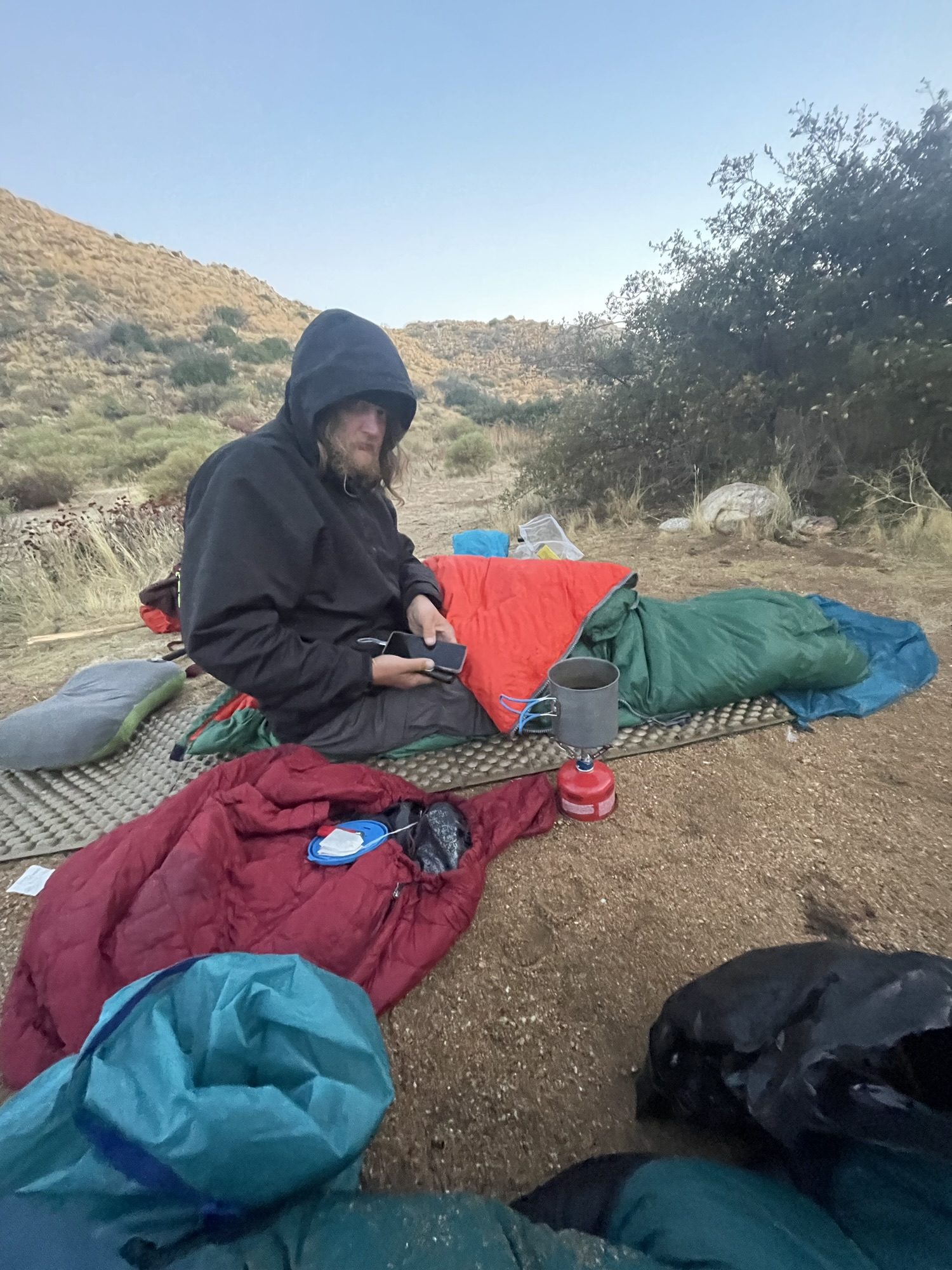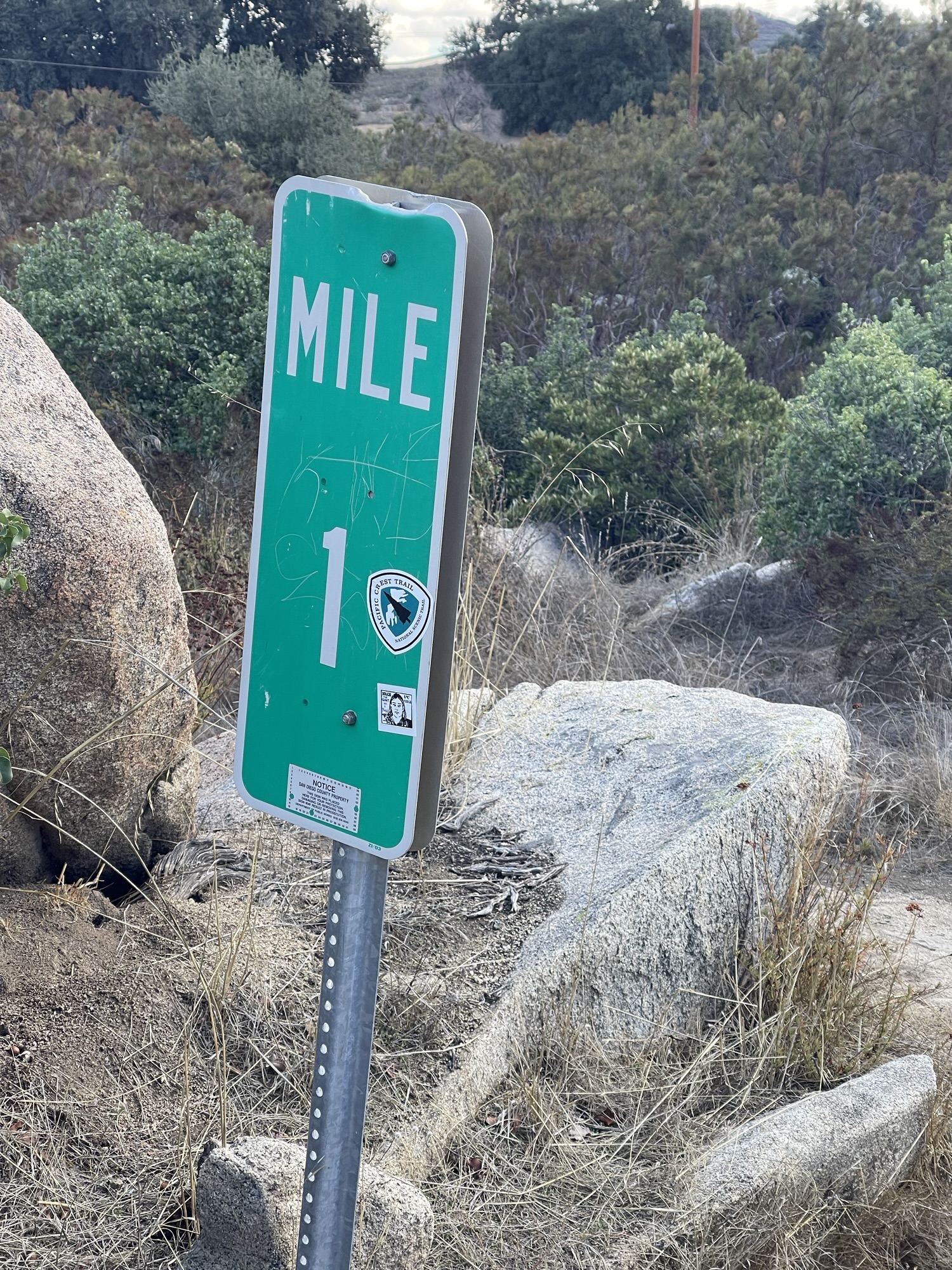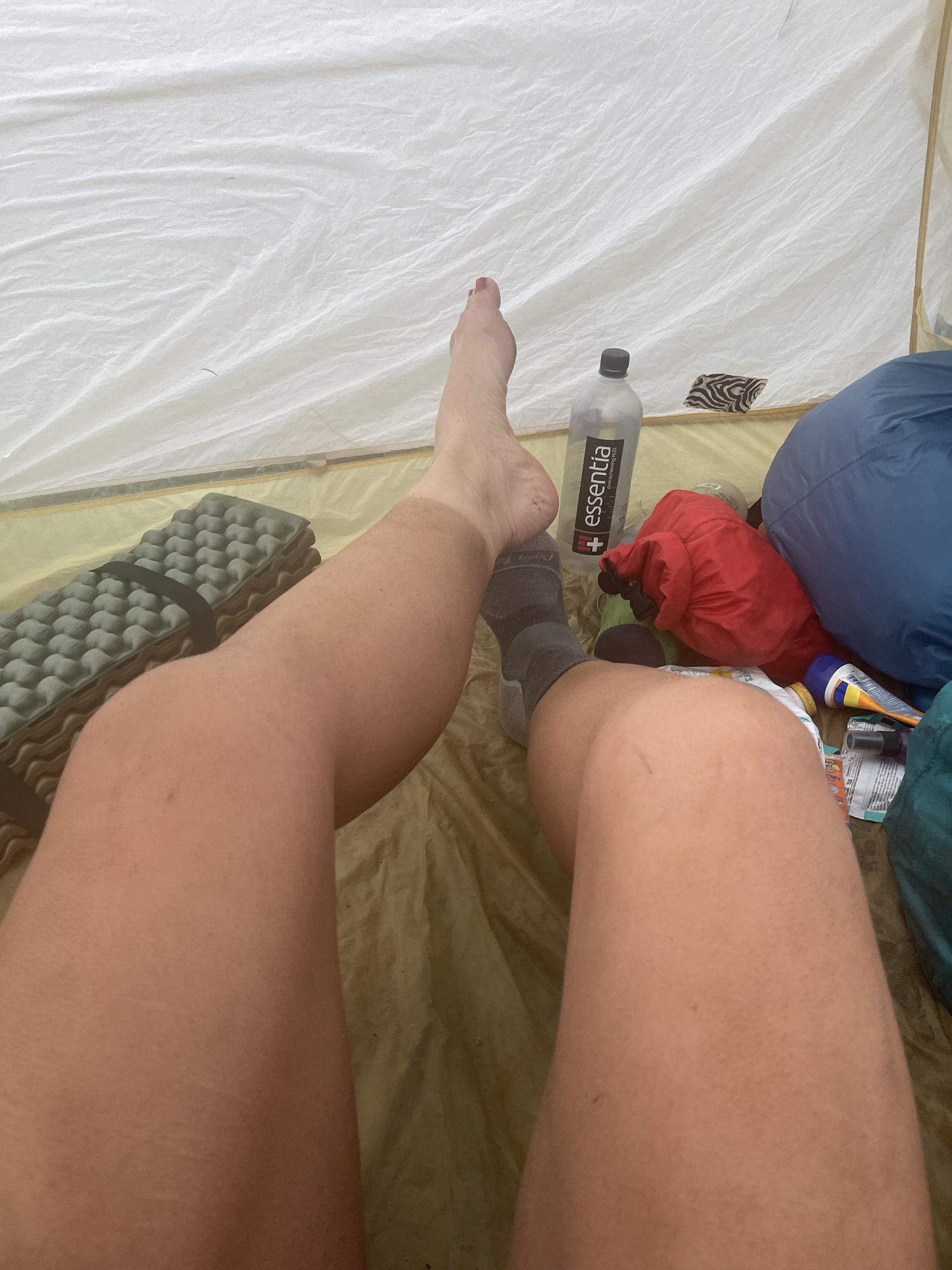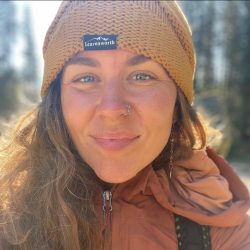The Thru-Hiker’s Lexicon
Before hiking my first thru-hike in 2023, I never would have thought I needed training in hiker terminology. I have received questions from the outdoor community such as, “What does base weight mean?” or “What is hiker trash?” To ensure we are all on the same page, here are some terms you will likely run into as a thru-hiker and throughout my posts on the Continental Divide Trail (CDT)!
Vocabulary List
A
Alternate – A trail that tracks off the main designated hiking trail that may have better scenery, food or town access, water access, or other opportunities. Some of the best parts of my hikes have been taking alternate routes.
AT – Short for the Appalachian Trail, one of the three longest trails in the United States traveling the U.S. East Coast for 2,190 miles.
B
Base Weight – The weight of your pack without food or water. This is important to know for every thru-hiker as you begin your journey. A heavy base weight means a heavy pack.
Bear Can – A canister where you can store your food to keep your items safe and secure from hungry bears (or curious rodents).
C
Camel Up – Usually this means you are expecting a long water carry. In dry seasons or through dry sections in the desert it is advised to carry more bottles of water (2-4 being the average for most hikers).
Cat Hole – If you are a human you have to poop. So pull out your trowel and dig a hole!
Cold Soaking – The process in which you soften food that you could normally cook, like soaking oats overnight. This is the way many hikers reduce pack weight by removing their heating element to cook food.
CDT – Short for the Continental Divide Trail, is the longest of the three trails in the United States barreling through New Mexico and Montana for over 3,100 miles (this is what I’m doing!).
Cowboy Camping – This is essentially camping without shelter. Generally, this means it’s you, your sleeping bag or quilt, and the big wide-open world. Make sure there’s no rain expected (otherwise you may feel a bit wet and crabby in the morning)!
 Image Source: Paige Combs, “Pacific Crest Trail Cowboy Camping,” 2023.
Image Source: Paige Combs, “Pacific Crest Trail Cowboy Camping,” 2023.
D
Day Hiker – You can usually smell their laundry detergent about a mile ahead. These are the civilized hikers who are far more groomed and likely carrying lighter packs. Sometimes they give you trail magic…
Dry Camping – These are nights where you camp without immediate access to water. Though these are not ideal conditions, it is common through dry sections of the trail.
F
FKT – This is short for the fastest known time, i.e., the famous hikers who make record time completing the thru-hike for the season.
Flip-flop – These hikers hike one section and for one reason or another may skip to different sections to complete their hike. In 2023, due to higher-than-average snowfall in the Sierra on PCT, NOBO hikers were hiking to the Sierra to then hike south from Washington state.
H
Hiker Box – These are boxes set in town for hikers to go through for equipment, gear, and food supplies that other hikers have gotten rid of. You may find these at motels, hostels, and trail angels’ houses.
Hiker Hunger – A phenomenon one does not know until they hike 30 mile days. The unstoppable hunger that allows a hiker to eat massive loads of food, up to 3000 calories or more in a day.
Hiker Midnight – This is the timeframe in which hikers fall asleep. Most thru-hikers are early to bed and early to rise. Often seeing us set up camp and going to bed by 7 – 9 PM.
Hiker Trash – It is a thru-hiker in town who has a dark tan, is caked on with dirt, and may have body hair, body odors, and ungroomed features. May be hungry, tired, and thirsty.
HYOH – Hike Your Own Hike as the saying goes, where every hiker has their own pace, way, and process for experiencing and enjoying the trail.
Hitch – A ride you will catch from town to the trailhead or another place that is needed.
J
Jedi – The experienced hikers when they have reached the end of their journey. Once the beginning of the hike weeds out folks due to injury or other complications, the hikers at the end have a shine to their eyes that only the wilderness can provide.
L
Leave No Trace – This is the process in which we pay respects to our environment, with anything we pack in, we pack out. This includes toilet paper and other toiletries used on the trail.
Lightweight – When someone’s pack weight is under 20 lbs.
M
Milestone – When hikers reach a certain point on the trail there will be markers that indicate these victories (1 mile, 100 miles, 500 miles, 1000 miles, etc.).
 Image Source: Paige Combs, “Pacific Crest Trail Mile 1 Marker,” 2023.
Image Source: Paige Combs, “Pacific Crest Trail Mile 1 Marker,” 2023.
N
Nero Day – Meaning ‘nearly zero’. This is a partial hiking day, not quite a zero, but may do 10 miles or less to get to or from a town or rest day on the trail.
Night Hiking – This is when a hiker decides to hike during not-so-typical hours, at night in the dark. This can be dangerous due to not being able to see your surroundings as well, but it can be successful if someone is comfortable or has a flat section to complete this part of the trail. Some hikers prefer to hike at this time!
NOBO – Meaning ‘northbound’. These are hikers that hike north on these major trails to Canada.
P
PCT – This is the west coast long-distance hiking trail that spans 2,650 miles called the Pacific Crest Trail. This is one of the most popular trails next to the AT.
Puffy – Most hikers have one. It’s just a down jacket that can also be used as a pillow. It can be used to layer clothing, to sleep in, and is a necessary part of the hiker attire.
Purist – This is a hiker who chooses to only hike the main designated trail.
R
Register – A book that logs all hikers as they pass through sections of the trail. These are often found in new wilderness and territory where hikers can leaf through and see how far ahead their friends are.
Resupply – When a hiker reaches a town they refill their food and toiletries either through preplanned shipments or through local shops.
S
Siesta – A hiker’s daytime slumber in the forest or under a shrub.
Slack Packing – When a hiker is completing a portion of a hike, or hiking off trail briefly to climb a peak they will often leave the majority of their gear behind and take only essential items, hence ‘slack’ packing. PCT hikers will often do this when climbing Mt. Whitney.
SOBO – When a hiker’s footpath ventures from the northern terminus to the southern terminus, aka ‘southbound’.
T
Trail Angel – These are generous people from the area who will often take hikers into their homes, shower or clothe them, feed them, and drive them to places where they need to finish their journey.
Trail Days – This is a day that’s geared towards hikers and it’s an opportunity for gear heads to check out displays for new gear. These often land in towns near the trail and during the hiker season.
Trail Legs – Your arms may look skinny, but those legs say something else. Hiker legs are built to climb mountains several times a day. It’s not unusual to complete two or three major peaks within 12 hours. Your thru-hiker legs begin to appear after a month of hiking.
 Image Source: Paige Combs, “Pacific Crest Trail Storm Trail Legs,” 2023.
Image Source: Paige Combs, “Pacific Crest Trail Storm Trail Legs,” 2023.
Trail Magic – These are special moments on hikes where hikers will be offered food, beverages, or other generous acts from people they meet on the trail. These can also be small tokens left behind from other hikers in storage boxes or bear boxes.
Town Day – This is a day that hikers plan to arrive in their next town where they can rest, charge up, and resupply their food.
Town Food – Food that hikers dream about on trail. Any food that is fresh and heavy in weight that they cannot carry while on their thru-hike.
Tramily – Your new family, the people who adopt each other along the way.
Triple Crowner – Someone who has completed all three major hikes in the United States including AT, CDT, and PCT.
U
Ultralight – When a hiker’s base weight is less than 10 pounds (this is definitely not me…).
V
Vitamin I – The thru-hiker medication preference for pain, is Ibuprofen.
Vortex – When hikers enter into society and have challenges getting back on the trail. The feeling of the pull back to the ‘normal’ world.
Y
Yoyo – When a hiker reaches the end of their destination at either the northern or southern terminus and decides to hike back in the other direction.
Z
Zero Day – A day of rest for hikers which can occur both on or off the trail where they complete ‘0’ miles for that day.
Other
24-Hour Challenge – A challenge that thru-hikers will attempt to see how many miles they can complete in 24 hours. So start your clock annnnd go!
Food Challenge – Any place along the trail that has a challenge around consuming large amounts of food whether that’s to eat a burger or burrito or pounds of pancakes. This can also be a self-guided challenge such as a hiker choosing to eat pop tarts for 500 miles.
Whose land am I on? Learn why it’s important to respect the land we travel on.
What am I missing? Comment below!
This website contains affiliate links, which means The Trek may receive a percentage of any product or service you purchase using the links in the articles or advertisements. The buyer pays the same price as they would otherwise, and your purchase helps to support The Trek's ongoing goal to serve you quality backpacking advice and information. Thanks for your support!
To learn more, please visit the About This Site page.

 ">
">


Comments 1
Wishing you a fantastic adventure! Contact me as you approach Pagosa Springs or Platoro, CO. Always love helping a thru hiker.